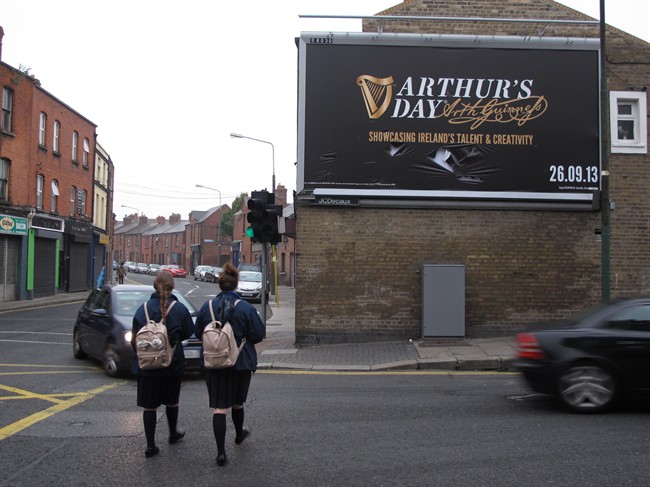DUBLIN – Ireland’s love affair with pub and pint is sparking national soul-searching as never before because of an unofficial holiday dreamed up by Guinness.

Thursday’s celebrations of Arthur’s Day, honouring the 18th-century founder of Ireland’s quintessential drink, feature surprise musical performances in 815 pubs and clubs across Ireland as well as concerts worldwide from Malaysia to Jamaica.
Launched in 2009, Guinness says the annual festivities provide a needed tonic for a 7,500-strong Irish pub network struggling to maintain profits in the face of a five-year debt crisis that has ravaged employment and incomes.
Many pubs are offering free pints of the dark brown stout at 5:59 p.m. — a reference to the founding of Guinness in 1759 — followed by the appearance of a band or singer, among them internationally popular acts, many kept secret until that moment. All entertainers are paid by Guinness’ British parent, Diageo.
“It’s really a musical treasure hunt. It’s one of my favourite nights of the year,” said David Doolan, a 28-year-old software engineer who plans to follow tweeted tipoffs as musical acts turn up in Dublin pubs. He’s caught parts of impromptu performances by Tom Jones, Mumford & Sons and Stereophonics in past festivities.
But this year, Guinness has been put on the defensive amid surging protests that Arthur’s Day is compounding an alcoholic culture that costs Ireland 3.7 billion euros ($5 billion) annually in hung-over workers, a Europe-leading rate of liver disease, late-night vandalism and violence in hospital emergency rooms.
“They shouldn’t call it Arthur’s Day. They should call it Vomit Day,” said Aisling Fitzsimons, a 50-year-old manager of a convenience store who says she has to hose down the sidewalk outside most weekends.

Get weekly money news
Two performers who definitely aren’t playing are Irish folk singer Christy Moore and the Celtic rock band The Waterboys. Both have penned anti-Arthur’s Day songs that harness an Irish sense of unease of being played for fools by a brewing behemoth.
“Arthur’s alco-holiday is coming ’round again. He’s the patron saint of porter, canonized by the advertising men,” Moore, a recovering alcoholic, sang Wednesday night during a nationally televised debate on state broadcasters RTE focused on the Guinness promotional machine.
The song’s punch line predicted that Ireland’s emergency rooms would be transformed into “drunk tanks” while “Diageo goes AWOL at closing time.”
But one of this year’s star attractions, Dublin rock band The Script, accused Moore of hypocrisy and of using the protest song to generate free publicity for his own upcoming album.
“If Christy Moore has an idea about how to fund hundreds of free music events and countless musicians in a festival, then let’s hear it,” said Script frontman Danny O’Donoghue. “If Christy feels that strongly about it, ban alcohol from all your gigs.”
All sides agree Ireland has a deeply ingrained alcohol problem. Government statistics show that Irish households last year spent 7.7 per cent of their money, or 6.3 billion euros ($8.5 billion), on alcoholic drinks. That’s double what they spent on clothing and more than 2,100 euros ($2,800) per adult, with women increasingly drinking hard liquor as much as men.
“Diageo has invented Arthur’s Day as a pseudo-national holiday for the purposes of marketing its products, especially to young people, thereby stimulating greater consumption of alcohol,” said Alex White, the government minister responsible for policy on alcohol and drugs.
Ireland’s Cabinet is mulling whether to impose minimum price controls on alcoholic beverages and restrictions on advertising and event sponsorship in a country where Guinness’ name adorns everything from sports jerseys to rail bridges. Guinness also brews several other European and American beer brands in Dublin.
Guinness says it’s keeping an open mind on changing Arthur’s Day next year to focus less on pubs and pints, and more on the arts, but insists nobody’s being forced to drink when watching musical performances.
The Irish corporate relations director of Diageo, Peter O’Brien, said his own sister is a nurse and he understands fully how alcohol abuse strains Ireland’s emergency services at night.
“As we’ve lived through austerity, and we’ve had a real change in society, we’ve started to question our relationship with everything: the (Catholic) church, big business, politicians. And we’re questioning our relationship with alcohol,” O’Brien said.
But he said Guinness, as the country’s dominant brewer, still needed to do more to promote the pub as a centre of Irish life and tourism. He noted a report published this week by the Drinks Industry Group of Ireland — a lobbying group of which he is chairman — found that, since Ireland’s economy went bust in 2008, Ireland’s pubs had shrunk by nearly 1,000 and employed 17 per cent fewer people.
Ireland’s Royal College of Physicians has appealed for a public boycott of Arthur’s Day and says Diageo is contributing to a doubling of deaths by liver disease since 1995.
“We have a progressively worsening relationship with alcohol in Ireland,” said Dr. Stephen Stewart, director of the Liver Disease Center in Dublin’s Mater Hospital, where he regularly sees patients in their 30s facing life-threatening liver failure.
But some say the critics have picked a conveniently easy target in Guinness — when it’s really Ireland that needs to look in the mirror.
“There’s an alco-holiday happening all the time in Ireland,” said Paddy Cullivan, a Dublin musician and satirist. “It’s called Friday and Saturday night.”







Comments